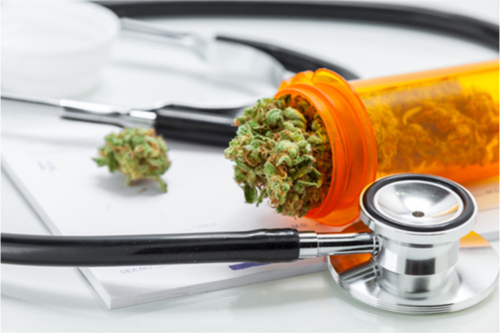What are the Long-Term Effects of Cannabis?
Posted 7 years ago by Ian Shutts

Cannabis is an herb, but unlike most herbs, it is also considered a drug because of its psychoactive effects. Although cannabis has many therapeutic benefits, it also has long-term negative effects.
It should be noted though that there are many types of cannabinoids found in the plant, and not all of them produce psychoactive effects. CBD, for example, is a nonpsychoactive cannabinoid used for medicinal purposes. It doesn’t produce any adverse side effects like THC does, which is the primary cannabinoid that produces the psychoactive effects of cannabis.
However, if CBD and THC are used together and in proper dosages, the therapeutic effects of medical cannabis are magnified. Both cannabinoids enhance each other’s therapeutic effects, with CBD cancelling out the psychoactive effects of THC. This is called the entourage effect.

Medical Versus Recreational Cannabis
Medical cannabis, as the name implies, is used for therapeutic purposes. It’s used to relieve pain, lessen seizures, decrease spasms and spasticity, reduce inflammation, ease anxiety, and alleviate depression, among others.
Recreational cannabis is used to enjoy the “high” cannabis is known for. It makes them feel calm and relaxed, and it also helps them maintain balance between responsibilities and leisure. Cannabis is a fun and pleasurable way of de-stressing and coping with life.

Short-Term Side Effects of Cannabis
The side effects of medical cannabis depend upon its THC content. The higher the THC content, the more pronounced the side effects are, which are similar to recreational cannabis use.
These short-term psychoactive side effects include but are not limited to:
Euphoria.
Paranoia.
Increased anxiety and panic attacks.
Hallucinations.
Mood changes.
Altered senses.
Balance problems and reduced coordination.
Increased drowsiness and sleepiness.
Cognitive changes like slower thought process, inability to pay attention, memory problems, slurred speech, and visuospatial problems.
Short-term cannabis use also has physical effects like high blood pressure, low blood pressure, as well as increased and rapid heart rate.
Long-Term Effects of Cannabis
Your body can get used to medical cannabis, so you may have to adjust your dosage from time to time to prevent tolerance. But the potential therapeutic benefits of medical cannabis far outweigh its disadvantage. Medical cannabis, especially if carefully monitored, has a relatively reasonable safety profile, compared to other conventional drugs like opioid-based painkillers, NSAIDs, antiepileptic drugs, etc.
Recreational cannabis though has far-reaching long-term effects that can affect not only one’s health but relationships and finances as well. Below are some of the long-term effects of cannabis.

Tolerance. In time, your body develops tolerance to cannabis that you will need to use more just to feel its effects. Our cells have cannabinoid receptors, and faced with high levels of cannabinoids, some of the receptors downregulate. This means that there is a reduction in the number of cannabinoid receptors, making the cells less sensitive to cannabinoids.
Dependence. Cannabis can be addictive because it stimulates the pleasure centers of the brain. The more you use cannabis, the more it stimulates this part of the brain and makes you feel good so you crave the pleasure it brings. You become dependent on using cannabis. Individuals who started using cannabis at an earlier age become more vulnerable to cannabis addiction.
Withdrawal symptoms. The moment you stop using cannabis, you develop withdrawal symptoms. Some of these include flu-like symptoms with chills and increased sweating. Other symptoms include appetite changes (increased or decreased appetite), increased agitation and irritability, increased anxiety and nervousness, restlessness, depression, headache, gastrointestinal upset (stomach pain and diarrhea), sleep problems (insomnia or excessive sleep), fatigue, etc.
Decline in intelligence quotient. One study showed that chronic cannabis users, especially those who started in their adolescent age, have an IQ decline of up to 8 points. This is because the brain of an adolescent is more vulnerable to the harmful effects of cannabis, resulting in structural brain changes especially in the white matter. Not only does this affect their attention and memory, but it also contributes to impulsive behaviors, poor thinking and learning process, inability to perform complex tasks, and the decline in their IQ level and cognitive functions.
Early-onset schizophrenia. Chronic cannabis users who suffer from or have a family history of mental health problems are more prone to early-onset schizophrenia and psychosis, especially if they started the habit in their adolescent years.
Increased health risks. Cannabis smoke can not only irritate the lungs and lead to breathing problems but affect the heart as well. It causes increased heart rate by as much as 50 beats per minute, making cannabis users with heart problems more vulnerable to heart attack.
Pregnancy risks. Smoking cannabis during pregnancy can result in preterm labor, low birth weight, long-lasting cognitive impairments of the child, and increased risk of sudden infant syndrome.
Other marijuana-related problems include relationship problems since cannabis dependence and its effects can put a strain on relationships (personal, social, and professional) and financial difficulties since you do need money to sustain your cannabis dependence/addiction. In the end, all these will take a toll on the chronic user and result in lower life satisfaction.
Cannabis does have therapeutic advantages and there’s no record of anybody dying from cannabis overdose, but it does have negative long-term side effects to be aware of.